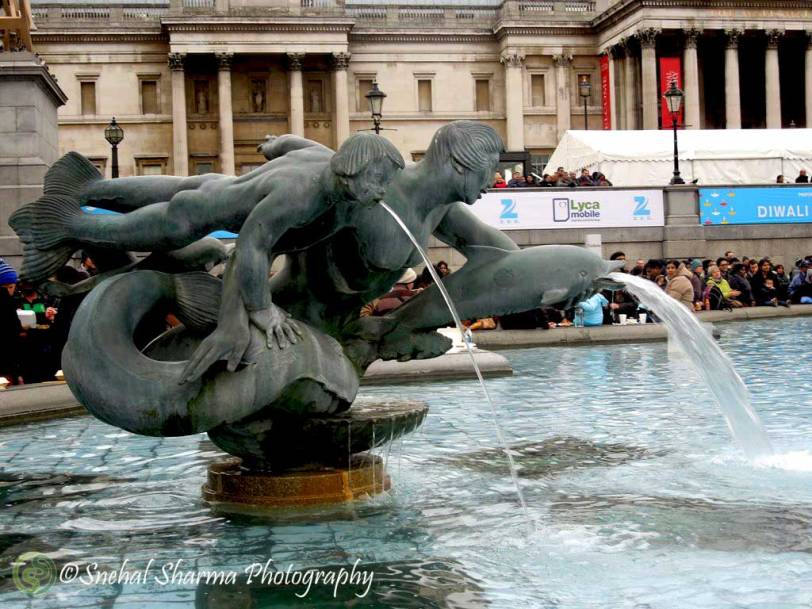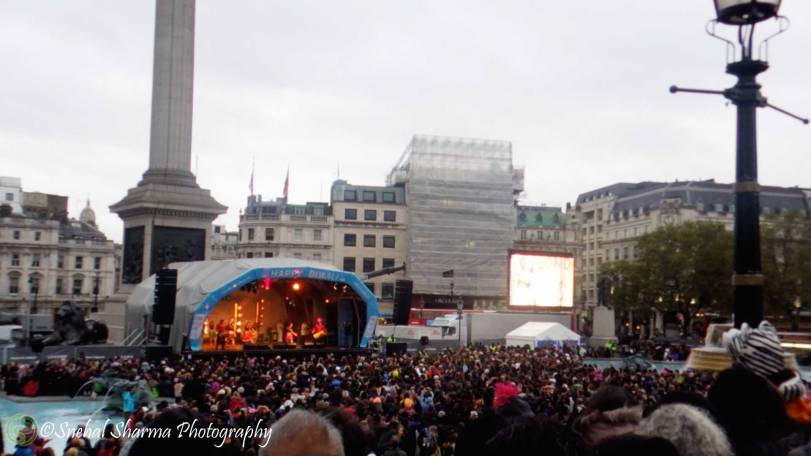Google ‘Diwali London’ or more grammatically appropriate ‘Diwali in London’ and the first link that pops up is ‘Diwali on Trafalgar Square’.
For over a decade now Diwali has become synonymous with the Trafalgar Square. The festival of lights that is the central festival for Hindus is celebrated with a heady mix of music, dance, food and live performances . Being an Indian in London, I decided to join in and witnessed what made me feel very much at home.
The Hindu calendar determines the date for Diwali so it varies in the Western calendar. It usually falls in the months of October or November.
The festival commemorates the victory of good over evil, light over darkness and knowledge over ignorance. The festival has further traditional significance in different in different parts of the country.
The festival though rooted in Hindu culture is celebrated with equal gusto around India by Hindus, Muslims, Sikhs and Jains besides others.
To celebrate or not to celebrate
Diwali for me has always and always meant family time. Sitting down for prayers and later opening up the family album and playing those embarrassing childhood videos for family and relatives for the nth time.
I had been itching to go back home to celebrate Diwali with friends and family, but since it’s neither Christmas nor are the tickets super cheap, I had resigned to celebrating it here. I had almost decided to give the Diwali celebrations a skip, fearing it would make me feel miserable as I countdown to Diwali ceremonies back home.

There are a number of statues and sculptures in the square, with one plinth displaying changing pieces of contemporary art.
What helped, however, was the fact that I had to film an assignment and since I couldn’t go home, I realised that this was the closest I would be getting to celebrating it this year.
First Diwali in London
Any first in life is exciting (researching for assignments being the prime exception to the rule). And it gets better when as you start noticing how much your culture has been able to penetrate the roots of another country. And you know you’re not boasting when you have the Mayor of London hosting the event. Almost.

Trafalgar Square is owned by the Queen in Right of the Crown, and managed by the Greater London Authority. The event, however, was organised by the Mayor of London.
Though this year the Diwali is on the 13th of November, but it came quite early to London, about 15 days to be precise. That, however was no deterrent as around 40,000 (organiser estimates) people turned up.
Being a part of such a big celebrations can have a humbling effect, even for a person like me who otherwise avoids large gatherings. Seeing visitors and nationals from all over the country if not world, dancing to folk songs and Bollywood numbers along with their Indian counterparts was really a moving experience that added to the memories.
The festival of lights
There is a reason that Diwali is considered the biggest and brightest festival of India, for it quite literally is so. (The word Diwali of Deepavali translates into row of lights.) The festival has historically been celebrated for over four days i.e. Naraka Chaturdasi, Amavasya, Kartika Shudda Padyami and Yama Dvitiya (Aka Bhai Dooj)

Scores of crowds, 40,000 as per organisers, gathered at Trafalgar Square to be a part of the annual Diwali celebrations.
However, the current generation primarily identifies with the third and fourth day of the celebrations. Besides illuminating homes with lights with diyas and candles, on the third day, people burn firecrackers to express their joy and to make the gods aware of their plentiful state.

Song and Dance: The celebrations, though centered around Diwali, also included the traditional garba dance along with live music performances.
The tradition has long been viewed an expression of obeisance to heavens for the attainment of health, wealth and prosperity. Though, with the drive towards curbing pollution, many people have decided to go easy on bursting the crackers and let lighting homes become the new age symbol of expression of joy.

Some of the bigwigs that performed live at the event included singers Ash King, Sonia Panesar, Juggy D, Navin Kundra and music composer/singer Bali Bhrambhatt.
The fourth day is called Bhai dooj in which sisters pray for their brothers’ long lives. This is again a day of family get together and well, lots and lots of delicious traditional food.
On a lighter note
One Indian boy to another, “What do you think is Bruce Lee’s favorite festival?”
“That’s simple,” the other boy answers, “It’s Diwa-Lee.”
From Darkness unto Light
Beyond the victory of good over evil, Diwali stands for celebration, happiness, togetherness and family time
On a more philosophical note, the tradition of Diwali at this juncture means a passage of cleansing and looking inwards.
Not having a family member around on a day like this can often lead to self-reflection and deep-thought. But events like the celebrations at Trafalgar do make the transition easier.
Looking forward to Christmas now, London!


Also cool to celebrate with people, isn’t it?
Absolutely 🙂